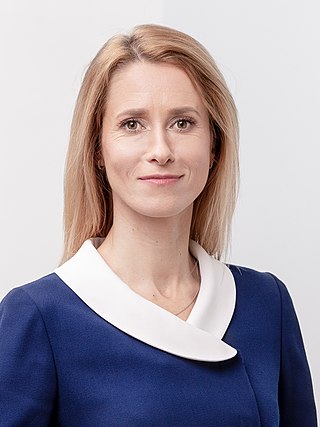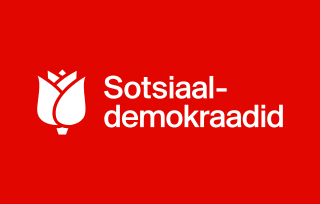Related Research Articles

The prime minister of Estonia is the head of government of the Republic of Estonia. The prime minister is nominated by the president after appropriate consultations with the parliamentary factions and confirmed by the parliament (Riigikogu). In case of disagreement, the parliament can reject the president's nomination and choose their own candidate. In practice, since the prime minister must maintain the confidence of parliament in order to remain in office, they are usually the leader of the senior partner in the governing coalition. The current prime minister is Kaja Kallas of the Reform Party. She took the office on 26 January 2021 following the resignation of Jüri Ratas.

The Social Democratic Party is a centre-left political party in Estonia. It is currently led by Lauri Läänemets. The party was formerly known as the Moderate People's Party. The SDE has been a member of the Party of European Socialists since 16 May 2003 and was a member of the Socialist International from November 1990 to 2017. It is orientated towards the principles of social-democracy, and it supports Estonia's membership in the European Union. From April 2023, the party has been a junior coalition partner in the third Kallas government.
This article gives an overview of liberalism and centrism in Estonia. It is limited to liberal and centrist parties with substantial support, mainly proved by having had a representation in parliament. The sign ⇒ denotes another party in that scheme. For inclusion in this scheme it is not necessary that the party has labeled itself as a liberal party.
This article gives an overview of liberalism in the Republic of Moldova. In the years from 1918 through 1940 and 1941 through 1944, what is today the Republic of Moldova was part of Romania, so the Romanian political parties were active in Moldova. It is limited to liberal parties with substantial support, principally those with a history of representation in parliament.

Jaan Tõnisson was an Estonian statesman, serving as the Prime Minister of Estonia twice during 1919 to 1920, as State Elder from 1927 to 1928 and in 1933, and as Foreign Minister of Estonia from 1931 to 1932.

The Social Democratic Party, officially the People's Party, was a social-democratic political party in Iceland.
The Estonian Social Democratic Workers' Party was a political party in Estonia between 1917 and 1925. The leaders of the party, founded on platforms of patriotism, Estonian independence, and social justice, made a major contribution to the drafting of the first (1920) Constitution of Estonia.
The Russian Party in Estonia was a minor political party in Estonia.

The Popular Front of Estonia, introduced to the public by the Estonian politician Edgar Savisaar under the short-lived name Popular Front for the Support of Perestroika, was a political organisation in Estonia in the late 1980s and early 1990s. Edgar Savisaar introduced the idea of popular front during a TV show on 13 April 1988. The idea was developed through the year and finally The Estonian Popular Front was established on 1 October 1988 with a massively crowded congress which turned to a culmination of the first phase of the Singing Revolution.

The Estonian Democratic Labour Party was a social-democratic political party in Estonia. The party was founded in February 1989. The party was led by Vello Saatpalu. In June 1989, the party sent a delegation to the Socialist International congress in Stockholm.
The Russian Social Democratic Party of Estonia was a social democratic political party in Estonia. On September 8, 1989, the party merged into the Estonian Social Democratic Party.
The Republican Party was a political party in Estonia, founded in 1999. The chairman of the party was Kristjan-Olari Leping, a lecturer of economic theory at the pärnu college of the University of Tartu. The party was of neo-conservative, new rightist and national conservative orientation; it identifies itself as close to Pro Patria Union and Reform Party of Estonia, but more radical. The organization was also strongly eurosceptic.
The Estonian Liberal Democratic Party, abbreviated to ELDP, was a social liberal political party in Estonia that existed between 1990 and 1994. The ELDP was founded on 9 March 1990, during the Estonian Soviet Socialist Republic, by the merger of the Liberal People's Party and the Free Democratic Party.
The Estonian Socialist Workers' Party was a political party in Estonia.
The Estonian Socialist Revolutionary Party was a political party in Estonia during the early 20th century.
References
- 1 2 Johansson, Karl Magnus (2008) External Legitimization and Standardization Of National Political Parties: The Case Of Estonian Social Democracy , Journal of Baltic Studies, 39:2, 157 — 183